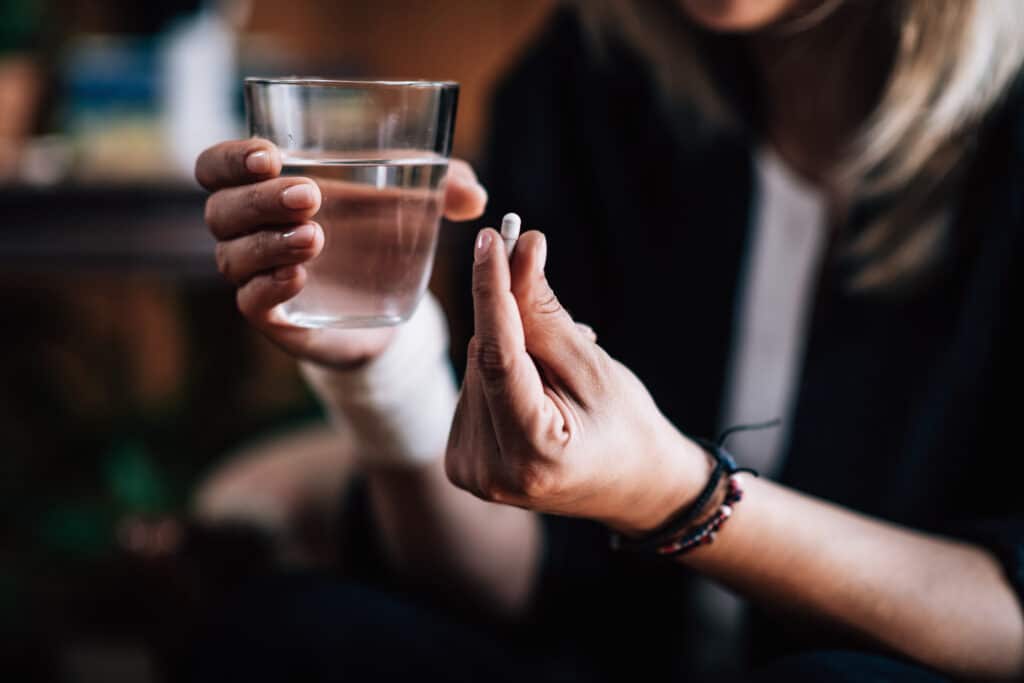Granite Recovery Centers currently has 12 drug and alcohol rehab facilities throughout the state of New Hampshire, but our clients come from all over the country. From inpatient rehab treatment to intensive outpatient programs, our locations provide a continuum of care that guides clients step by step on their recovery journey.
Apart from being easily commutable from one facility to another, our alcohol and drug rehabilitation centers are also in close proximity to bordering states throughout New England. Clients seeking help with Substance Abuse Disorder come to us from throughout the region—New Hampshire, Massachusetts, Maine, Vermont, Connecticut, Rhode Island, and beyond.
We take great pride in being able to serve residents from communities near and far, because it means we’re making a difference that’s reaches further than just local. Below, you’ll find more information (including directions to our centers) on how we are serving your state.
Alcohol and Drug Rehab for
New Hampshire Residents
Nestled right on the U.S.-Canadian border, New Hampshire is often noted for being a quiet state with lots of picturesque towns. It’s home to many forested areas with sap houses and ski slopes. The Lakes Region attracts many campers who love connecting with nature while Hampton offers some amazing beaches on the Atlantic Coast. However, there is another side to the Granite State. Like much of the country, New Hampshire has been hit hard by the opioid epidemic. Other types of drug and alcohol abuse is prevalent around Manchester and Concord as well.


Alcohol and Drug Rehab for
Massachusetts Residents
Massachusetts ranks among the top ten states in the United States for both alcohol and drug problems. Without enough access to proper care, residents look elsewhere for addiction help. Aside from an easy commute and picturesque landscape, our inpatient and outpatient drug rehab facilities provide Massachusetts residents with the effective, integrated continuum of care they need to get sober and stay sober.
Alcohol and Drug Rehab for
Maine Residents
Maine, like many states, has been hit hard by the drug epidemic, and is in the top 3 states for alcohol consumption. We often have Mainers come to us needing more than their state can provide, in terms of resources and effective programs. Our two inpatient rehab facilities are not only conveniently close to most Maine points, but they also offer an unparalleled mountainside panorama, compassionate staff, and a fully integrated continuum of care proven to be effective in getting Maine residents well, and keeping them well.


Alcohol and Drug Rehab for
Connecticut Residents
Connecticut is one of the top ten states for deaths attributable to drug overdoses, and has high levels of alcohol consumption, as well. Despite local and state-wide efforts, Connecticut continues to have limited resources for treatment of substance use disorder and co-occurring disorders. These are just a few of the reasons we welcome residents from Connecticut, along with being conveniently close yet far enough away to limit client distractions. All of our inpatient drug rehab facilities offer a beautiful New Hampshire respite that provides a fully-integrated continuum of care, as well as a compassionate team dedicated to each client’s recovery.
Alcohol and Drug Rehab for
Rhode Island Residents
Rhode Island ranks high in the nation for fentanyl and illicit drug overdose deaths, and is third highest for alcohol-related driving deaths. While state and city programs have helped combat the epidemic, there still just aren’t enough resources in Rhode Island to effectively treat drug addiction. Our clients from Rhode Island come to us because we can offer them the care they are missing in-state. GRC has three inpatient alcohol and drug rehab facilities tucked far enough away in bucolic New Hampshire, but still close enough for family to visit. And we offer them an effective way to get well from their addiction.


Alcohol and Drug Rehab for
Vermont Residents
Vermont has been hit hard by the opioid epidemic, with its residents in the 18-25 age bracket having among the highest heroin rates in the US, and the whole state itself having one of the highest percentages of illegal drug use. It also has one of the highest rates of excessive drinking in the country. While the state has done their best to provide adequate addiction treatment for all in need, the problem exceeds what they are able to offer. Our facilities are close enough to the Green Mountain state, but far enough away that clients can focus completely on their treatment program to find their footing in recovery.
What You Need to Know about Drug Rehab
The nation’s opioid crisis continues to destroy and claim lives as ever-increasing numbers abuse prescription painkillers and other highly addictive substances. Alcohol abuse is widespread, with the rate of Alcohol Use Disorder increasing among certain demographics. Benzodiazepines are commonly abused in what many medical professionals are referring to as a hidden epidemic. All of these substances present serious health risks to users, including the possibility of overdose, the physical decay wrought by heroin, the cognitive decline of alcoholism, or the severe withdrawal symptoms of benzodiazepine dependence.
Today, it is not just an opioid crisis we have on our hands; it’s an addiction crisis. While many try to quit on their own and live a life of sobriety, few make it. The only proven effective defense is drug rehab. If you or a loved one has a drug addiction, this is what you should know about drug rehab.
Why People Need Drug Rehab
Apart from the obvious health hazards of using such drugs, there are numerous threats posed by addiction. Addiction is a full-fledged disease that compels one to keep using a given substance, no matter the cost to one’s physical, emotional, mental, social, or spiritual health.

Addiction may arise due to desperation to control chronic pain, a primary cause of the nation’s opioid epidemic. It may come out of an attempt to soothe some unacknowledged emotional pain, trauma, or anxiety. Regardless of the form it takes, addiction has profound consequences for every aspect of one’s life, worsening problems rather than addressing them.
Substance abuse and addiction are difficult to treat alone. Many set out with the best of intentions to eliminate a dependence or addiction, but then encounter far too many temptations and opportunities for old habits to resurface. While some may be successful going it alone, seeking professional help for a substance abuse disorder is far more likely to result in real, long-term recovery. The earlier one seeks help for addiction, the more likely positive recovery outcomes can be achieved.
Choosing the Right Drug Rehab
Due to the variety of experiences and situations addicts face, there are numerous considerations to take into account when searching for the right care. How do you know what kind of rehab to go to? How long should it be? Should you have follow-up care? How long does that last? The questions about finding the right rehab for your addiction can be overwhelming. In order to get yourself started on the right track to finding a drug rehabilitation program that meets your needs, here are some characteristics to think about:
- Inpatient drug rehab or outpatient program (IOP)?
- 30 day, 60 day, or 90 day drug rehab?
- 12-step program, clinical treatment, or both?
- Holistic or experiential programs?
- Medical detox on-site or referred?
- Co-occurring disorder treatment?
- Gender-specific or gender-separate treatment?
- Drug rehab environment?
The Full Continuum of Care at GRC
Granite Recovery Centers offers a wide spectrum of substance abuse and drug rehab care that is designed to meet you or your loved one wherever you are in your battle with addiction. If you are new to recovery and need the structure of an inpatient approach, we can help.
If you’re in early recovery and need a safe environment in which to hone the skills needed to transition back to daily living, we offer sober living accommodations. From detox to residential care to extended care and sober living and outpatient programs, our unique and proven approach to addiction recovery can help you.
Detoxification is often the first step that addicts face when deciding to confront an addiction. Addiction often comes with serious physical and mental withdrawal symptoms when clients cease using certain drugs. There are a number of variables that determine whether a person should participate in medically-monitored detox from drugs. They are:
- Substance type (alcohol, meth, heroin, etc)
- Time elapsed since last use
- Amount of substance used
- Presence of co-occurring disorder (dual-diagnosis)
- Other medications used
- The person is not a danger to themself or others
- The person does not need medical intervention
- The person is capable of self-evacuation in the event of an emergency
Medical detox facilities can be on-site at an inpatient drug rehab facility, but most often are offered separately and in a different location than the residential rehab. Detox can be conducted at hospitals, detox specialty centers, or in conjunction with residential care. They also vary based on the level of care, and are typically designated as acute or sub-acute. Acute level detox refers to overdose and life-threatening care, whereas subacute is for non-emergency detox. Granite Recovery Centers offers an on-site subacute medical detox supervised by medical professionals at our Green Mountain Treatment Center in Effingham, New Hampshire. Granite Recovery Centers provides medical detoxification for people who do not need immediate medical intervention, are not a danger to themselves, and are capable of self-evacuation in the event of an emergency.
A major consideration when searching for drug rehab care is determining what type of treatment you should have: inpatient or outpatient. Inpatient drug rehab or residential treatment centers provide 24-hour care for clients with drug or alcohol addictions. Inpatient rehab typically involves staying at a residential facility where clients participate in:
- focused recovery programs
- skill-building sessions
- group and individual therapy
- community-based exercises
- clinical psychotherapy
- exercise/holistic therapy
- 12-Step curricula (if offered)
Inpatient drug rehab programs at Granite Recovery Centers offer 24-hour support for recovering clients in a safe, beautiful, and encouraging environment. Our inpatient drug rehab programs provide clients with supervised, structured living that includes community building, the practice and development of life skills, individual and group therapy from licensed clinicians, physical exercise, recovery-oriented study, and recreation. Combining a base of 12-step work with evidence-based clinical therapy, Our New Hampshire drug rehab centers’ unique approach to treatment draws from these two highly effective and proven recovery techniques to provide each client with individualized care.
With outpatient care, clients usually live at home or in a sober living home and attend therapy and other forms of care at a separate outpatient facility. Outpatient care is often appropriate for clients who need continued structure and guidance following primary care at an inpatient facility. As with inpatient rehab, outpatient programming varies greatly from facility to facility, but often have the following features:
- Group therapy
- 12-Step workshops/meetings (if applicable)
- Case management
- Holistic classes (yoga, meditation, etc)
- Skill-building workshops
- Career/education resources
- Access to psychotherapy
Granite Recovery Centers’ outpatient drug rehab services are 12-step-based and include the same integration of step work with evidence-based psychotherapy that is core to our treatment philosophy. We also utilize holistic therapies, meetings and workshops, and education in building recovery and life skills that help clients stay on track for continued recovery. Optional medication management, goal setting, and group work are also included in our Intensive Outpatient Program.
Aftercare in the form of sober living, is all about transitioning back into independent living, and giving individuals continued resources, direction, and purpose as they continue on their recovery journey. It’s also about offering strategies and techniques when temptation or difficult circumstances inevitably arise.
Granite Recovery Centers has options for aftercare rehab in four New Hampshire locations for those who desire the continued structure and support of post-primary care.
Our Aftercare Programs feature the following:
- Daily/weekly meetings and workshops
- Daily/weekly psychotherapeutic sessions offsite at a designated IOP
- Daily/weekly goal-setting and check-ins
- A 12-Step environment, daily/weekly progress evaluations of step work
- Gender-separate facilities
- 12-step coursework continuation
- Skill-building (life skills: financial management, finding employment, etc)
- Individual and Group Psychotherapy at off-site IOP
- Case Management
- 12-Step Study
- Goal Setting
- Meditation
- Exercise
Sober living homes can house clients who need a structured environment to continue getting well. Sober living houses offer:
- Staff that help keep residents on the path to independent living
- Rules about conduct and cleanliness
- An abstinent environment
Granite Recovery Centers offers sober living homes in Manchester, NH providing recovering addicts an environment of safety, support, and comfort that is conducive to sobriety. Sober living also offers:
- 12-Step meetings
- Steel-on-Steel peer groups
- Regular and random drug testing
- Residents must obtain a sponsor within their first week of residence
- Residents must secure at least one service position within their first week of residence
- Participation in chores and house cleaning
If you or a loved one needs help from your addiction and wants more information on our drug rehab programs, please contact our admissions specialists at (855) 712-7784.
If you or a loved one needs help from your addiction and wants more information on our drug rehab programs, please contact our admissions specialists at (855) 712-7784.


